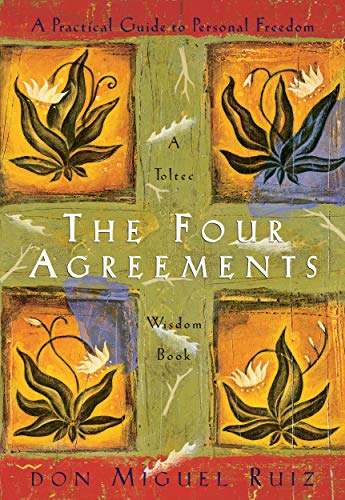

This article is an excerpt from the Shortform summary of "The Four Agreements" by Don Miguel Ruiz. Shortform has the world's best summaries of books you should be reading.
Like this article? Sign up for a free trial here .
The Four Agreements by Don Miguel Ruiz
Words are incredibly powerful. They can be used for good or to hurt others or ourselves. In this way, we can think of them as Black Magic or White Magic.
Words are like seeds in a fertile human mind: We can plant goodness or fear.
This first agreement asks us to be “impeccable” with our words. This is the agreement on which all the other agreements rest. Abiding by this agreement alone can change your life.
So what does it mean to be impeccable with your word?
- It’s about saying exactly what you mean.
- It means speaking with integrity.
- The literal meaning of “impeccable” is being without sin. So you can think of “being impeccable with your word” as not sinning against yourself or others when you speak.
Sounds easy, doesn’t it? But being impeccable with your word is also the hardest agreement to honor. We’ve learned to do exactly the opposite.
What We’ve Been Doing Wrong
We are careless with our words far too often. We usually don’t set out to hurt someone, but we forget the power words hold. The truth is, something cruel said once in an offhand manner can have a lasting impact on someone’s life. (Similarly, something said with truth and beauty and kindness will also have a lasting impact.)
Here are some examples of words creating fear and doubt:
- Hitler in Germany used the power of words to sway the emotions of millions, planting seeds of fear that resulted in mass destruction and war.
- On a smaller scale, think of the harried mom who’s momentarily annoyed at her singing daughter. The mom tells her child to be quiet since she can’t handle the singing right now. Unintentionally, this plants a seed in the child that tells her she can’t sing. She becomes quiet and refuses to sing again. The little girl has adopted a new agreement — that she must repress what she wants to do to be loved.
- A young child is told he’s ugly. He listens and believes he is ugly. No amount of encouragement will make him believe otherwise. With this new agreement in place, it’s as though he’s under a spell.
As you can see from the examples above, when we hear an opinion and believe it, we form an agreement. The opinion gains power. The judgment becomes part of us. Black Magic has created a spell that’s hard to break.
And it’s not just a problem with using our words to hurt others, intentionally or unintentionally. We too often use the power of the word against ourselves. How often do you say these types of things to yourself?
- I’m ugly.
- My hair is a disaster.
- I’m dumb.
- I can’t sing/do math/do anything.
- I have no sense of direction.
Little by little, these agreements weaken you, like a toxin.
The worst Black Magic of the word is gossip. Gossip is spreading around information about other people that may or may not be true. Gossip is pure poison, but ever so popular and even fun at times. After all, it makes us feel better to put someone else down and to see them in a worse predicament than us.
Gossip is like a computer virus. After the malware has been introduced, your computer doesn’t work correctly. It’s slower, vulnerable, in danger. When you listen to the gossip, you become infected just like the computer. You see the subject of the gossip in a different light, and you become a conduit to spread the gossip virus yourself.
We have to be aware that gossip is full of someone else’s motivations and point of view. This can bias you to see the world incorrectly without your realizing it.
Here’s an example: A student is looking forward to a new class with a new professor. But on her way to class, she runs into a friend who tells her this professor is a jerk. He’s awful! Our student listens and now looks at the professor through the eyes of the other person. Every harmless mistake the professor makes looks like it just confirms the gossip. She has no idea of her friend’s motivations, but now she’s infected to see the world through the friend’s eyes. If she hadn’t heard the gossip, she would see the professor more neutrally.
Gossip spreads, whether it’s being mindlessly repeated or spread intentionally as a calculated effort to bring someone down. The contagious poison of gossip creates what the Toltecs called the mitote. The mitote is defined as “the chaos of 1,000 voices all trying to talk at once in the mind.”
When You Become Impeccable With Your Words
So what do you do to stop using the word as a toxin?
When you are “impeccable with your word,” you:
- Say only what you mean
- Speak with integrity
- Stop your internal negative self-talk (“I’m stupid.”)
- Refrain from gossiping
Practicing this yields two benefits, in different directions:
- You protect your own mind from the outside – it’s no longer fertile ground for Black Magic. It listens only to words that come from a place of love.
- You’re not sending out Black Magic to others, affecting their lives. Rather you’re using the White Magic power of words to bolster others.
Using your words for good can plant new seeds in yourself and others – breaking old, bad agreements and creating positive, new ones. For example, telling a child she’s hard-working plants a seed of pride. If you hear someone singing and you tell him his voice is lovely, you may be helping to break a spell previously cast by someone else’s careless words.
Following this agreement helps you become happy and at peace. As you become impeccable with your word, more seeds of love will replace seeds of fear – in yourself and others.
As a result, you begin to form NEW agreements. When you understand this first agreement, you change the way you deal with yourself first the way you deal with others follows naturally.
———End of Preview———

Like what you just read? Read the rest of the world's best summary of Don Miguel Ruiz's "The Four Agreements" at Shortform .
Here's what you'll find in our full Four Agreements summary :
- What the Four Agreements are, and how they'll make you happier with life
- Why you need to take responsibility for your life, instead of blaming others
- How to achieve breakthroughs in your life and shake off old habits






